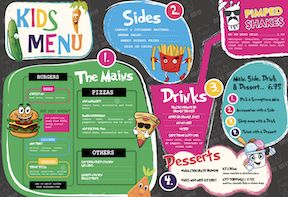Jesus Calls Us to Desire More
When I was a boy, I always looked forward to our summer trips from San Francisco to West Texas to spend vacation time with extended family. My two younger brothers and I would pile into our un-air-conditioned car, anxious to begin the long trek across the Southwest. At the end of each day’s journey, the three of us would beeline our way to the hotel pool to re-hydrate—something we really looked forward to after hours of being blasted in the back seat by the hot desert air. These were great adventures filled with the excitement of seeing new places and the extravagance of eating out (something we never did back home).
One year during our journey, my youngest brother did something completely out of character for his normally compliant nature. Despite a tight budget and strict instructions to the contrary, James defiantly placed the same order every time we stopped to eat. “I’ll have what Dad is having,” he would insist. Apparently, my little brother had noticed that the plate of food placed in front of our father always looked a lot more appealing than the one typically placed in front of him. That was all it took. From then on, all he wanted was what our father was having. At five years of age, my little brother didn’t know much, but he knew that anything Dad ordered would be better than what he knew to order off the Kiddie Menu. Genius!

If only we were that smart about what we desired in life. If we were, we would stop setting our hearts on things that are certain to disappoint us and start dreaming of things that promise to bring lasting satisfaction. We would forget about the Kiddie Menu, where the portions and satisfaction are limited, and turn instead to God. We would ask our Heavenly Father to do the ordering for us, trusting that His choices would be bigger, better and more satisfying. We would order what He was having—not mere happiness, but blessedness!
This is precisely the prescription we find in the Beatitudes. Rather than calling us to desire less, Jesus calls us to desire more. Rather than asking us to let go of our dreams, Jesus exhorts us to dream bigger. Rather than expecting us to be satisfied with mere happiness, Jesus invites us to experience what it is to be blessed. Happiness is what we order for ourselves, while blessedness is what we get when we let God order for us.
Squeeze More Joy Out of Every Day
Time magazine ran an article recently titled “14 Ways to Squeeze More Joy Out of Every Day." The author, Ellen Seidman, began: "Sometime this morning, during your shower or at work, you probably did a mental run-through of your day. You decided when you’d tackle various tasks and errands. Perhaps you vowed to hit the gym at lunchtime. Maybe you plotted to get out of something (apologies, PTA meeting). The one thing you forgot to plan for: happiness.”
The author then gives a list of 14 ways to be happy suggested by Barbara Fredrickson, a social psychologist at the University of North Carolina at Chapel Hill. The list, among other things, includes the following suggestions about how to be happy: Make happiness your goal, know what makes you happy, prioritize it, think happy thoughts, and make Sunday future-fun day (make plans for the next weekend).

A man, living in the third century, was dying when he wrote these last words to a friend: "It's a bad world, an incredibly bad world. But I have discovered in the midst of it a quiet and holy people who have learned a great secret. They have found a joy which is a thousand times better than any pleasure of our sinful life. They are despised and persecuted, but they care not. They are masters of their souls. They have overcome the world. They are truly a joyful people. These people are the Christians ... and I am one of them" (Riding the Joy Train by Wanda Jo Pence, p.18).
We who are Christians, followers of Christ, have learned a great secret: Jesus is the reason for the joy of joys. His presence in our life and the promise of eternal life in heaven with Him brings a transcendent joy to any set of circumstances.
If you want to squeeze more joy out of everyday life, fit more of Jesus into it!
Jesus said, "I have told you this so that my joy may be in you and that your joy may be complete" (John 15:11).
Winning The Lottery Without Losing At Life
People are buying tickets in droves in the hopes of winning the now $1.5 billion and growing lottery jackpot, not only the largest ever jackpot in the United States, but in the world.
ABC reports, “The jackpot is so big that billboards in Texas and around the country have to advertise the price as $999 million because they're not built to show billions.”
The way the lottery is growing in America, they may need to build new billboards for future drawings. Camila Domonoske with NPR writes:
$70 billion — [is] the total amount Americans spent on the lottery in 2014, the most recent year for which data is available, according to the North American Association of State and Provincial Lotteries.
CNN Money calculates that's more than Americans spend on sports tickets, books, video games, movie theaters and recorded music, combined.
NASA's annual budget, for comparison, is around $17 billion. Total U.S. foreign aid for next year: just shy of $38 billion.
It’s clear that Americans are chasing a dream, and they are willing to spend a lot of money to catch it. But there’s a problem, and it’s not just the 1 in 292 million odds of ending up with the winning ticket. Recent history has taught us that just because someone becomes instantly rich doesn’t mean they'll end up with any greater sense of happiness.
Domonoske explains:
Zero. That's the impact of a lottery win on net happiness, at least at first.
A famous 1978 study found that major lottery winners were no happier than ordinary folks, and actually got less joy from daily activities. A 2008 Dutch study found winning the lottery doesn't make a household happier.
Now, a caveat: Two studies out of England suggest that it is possible to win the lottery and be content — but only eventually.
"No researcher has ever found that people are happier in the first year after winning the lottery," one of the researchers told The New York Times
And the Times' social science reporter suggests that it might take longer and longer to find contentment the larger your win is.
Despite the high expectations, winning the lottery doesn’t solve our interpersonal problems, but will probably make things worse as friends and relatives clamor for their piece of the prize. Neither will it result in a greater sense of happiness as we suddenly have so much more wealth to worry about protecting, investing, etc.
Most will never have the chance to find out how they'd do with untold wealth, but that doesn’t mean there isn’t a lesson here for the rest of us. The reality is we all live with the same false hope as the lottery winner—the expectation that the next big promotion, the next good turn of fortune, will finally bring us the contentment and happiness that has eluded us so far.
Let the lesson of past lottery winners be a lesson to you. That transcendent, immune-to-life’s-assault happiness we all search for can’t be purchased or won, but is the byproduct of faith—the result of possessing spiritual riches.
“The blessing of the LORD brings wealth, without painful toil for it.” (Proverbs 10:22).